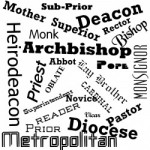Church Polity – Presbyterian

This is the third post in my series on church polity. (See my posts “Church Polity – Introduction” and “Church Polity – Episcopal.”) In this post, I am going to discuss the “presbyterian” form of church government.
According to Wikipedia:
Presbyterian polity is a method of church governance typified by the rule of assemblies of presbyters, or elders. Each local church is governed by a body of elected elders usually called the session or consistory, though other terms, such as church board, may apply. Groups of local churches are governed by a higher assembly of elders known as the presbytery or classis; presbyteries can be grouped into a synod, and synods nationwide often join together in a general assembly. Specific roles in church services are reserved for an ordained minister or pastor known as a teaching elder, or a minister of the word and sacrament.
For example, this is how the Church of Scotland describes its organization:
Church of Scotland government is organised on the basis of courts, mainly along lines set between 1560 and 1690. Each of these courts has developed committees, which may include other members of the Church, and those at national level now employ full-time staff…
At local level: the parish – the court is a kirk session. Kirk sessions oversee the local congregation and its parish, and consist of elders presided over by a minister.
At district level: the court is a presbytery. Presbyteries consist of all the ministers in the district and an equal number of elders, along with members of the diaconate (a form of ordained ministry, usually working in a complementary role in a ministry team in both parish and industry sector contexts).
At national level: the court is the highest court of the Kirk – the General Assembly. The General Assembly consists of around 400 ministers, 400 elders, and members of the diaconate, all representing the presbyteries.
Notice that the focus of the church government is on groups of leaders, either at the local, district, or national level. These groups make decisions for the church and hold authority over the church.
Other denominational churches and independent churches practice the presbyterian form of church government called “elder rule.” For example, this site supports elder rule:
As those who rule in the church, elders are not subject to any higher earthly authority outside the local assembly. Their authority over the church is not by force or dictatorial power, but by precept and example.
Similarly, those churches controlled by a board (whether the board is called deacons, elders, or directors), would be considered to have presbyterian polity.
Those who support the presbyterian form of church government, typically point to the use of the term “elders” (or presbyters) in the New Testament. Similarly, the proponents point to the use of elders in the plural, as well as plural forms of authority in the Old Testament and among the apostles.
Presbyterian polity rose to prominence during the Reformation when leaders of the various reformed churches decided to throw off the monoepiscopal rule of the Catholic Church.
————————————————–

I don’t have anything to add, but I wanted to comment and tell you that I appreciate this series. I am sure the discussion will come soon, this is just the setting of the stage. I enjoy it.
Hi Alan,
I suppose I am somewhat Presbyterian, in that I believe in plural eldership. But I was surprised to learn about all the synods, sessions and so on in Presbyterianism when recently reading the Perspectives book on church government(Five Views, B&H). I was much more impressed by the biblical case made by Akin and Garret in the book for congregational autonomy. As to the proof for synods, etc, from Acts 15, I think that Acts 15 itself shows that the decision made by the Jerusalem ‘Council’ involved the ‘whole church’, as the passage says. I devote a bit of space to the Jerusalem council on my website (see under Exegetical, Acts)